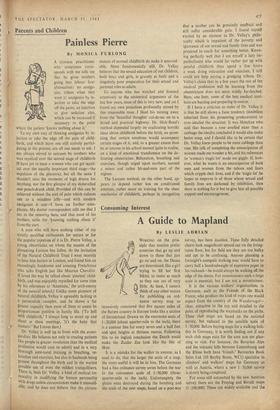Parents and Children
Painless Pierre
By MONICA FURLONG To my own way of thinking analgesics by in- jection to take the edge off the pain of child- birth, and which leave one still actively partici- pating in the process, are all one needs to ask. 1 am always stirred to sarcasm by mothers who wax mystical over the second stage of childbirth (I have yet to meet a woman who can get mysti- cal over the equally important third stage—the expulsion of the placenta), but all the same I shouldn't miss the moments of high drama for anything, nor the first glimpse of my dishevelled and punch-drunk child. Provided all this can be achieved without the sort of pain which reduces one to a mindless jelly—and with modern analgesics it can—I have no further com- plaints. My doctor correspondent tells me that I am in the minority here, and that most of his mothers settle for 'knowing nothing about it' from the start.
A man who will have nothing either of my strictly qualified enthusiasm for nature or for the popular rejection of it is Dr. Pierre Vellay, a young obstetrician on whom the mantle of the pioneering Lamaze has fallen. At the invitation of the Natural Childbirth Trust I went recently to hear him lecture in London, and found him an exceedingly handsome and amusing Frenchman Who talks English just like Maurice Chevalier. (I loved the way he talked about `pineless' child- birth, and was enjoyably mystified for some time by his references to 'Anastasia,' the arch-enemy of the natural school.) Unlike some pioneers of natural childbirth, Vellay is agreeably lacking in a persecution complex, and he shows a far greater capacity than most of them to assess its proportionate position in family life. (To hell with childbirth,' I always long to stand up and shout at these meetings, Vs the baby that matters l' But I never dare.)
Dr. Vellay is well up in front with the avant- gardists. He believes not only in treating patients
like people (a greater revolution than the medical profession would care to admit) and in a very thorough ante-natal training in breathing, re- laxation and exercises, but also in husbands being present throughout the birth and in the wariest possible use of even the mildest tranquillisers. There is, feels Dr. Vellay, a kind of medical im- morality in modifying the human personality With drugs unless circumstances make it unavoid- able, and he does not believe that the circum- stances of normal childbirth do make it unavoid- able. More fundamentally still, Dr. Vellay believes that the sexual education of our children, both boys and girls, is gravely at fault and a singularly poor preparation for their sexual and parental roles as adults.
To anyone who has watched and listened attentively to the obstetrical arguments of the last few years, none of this is very new, and yet I found my own prejudices profoundly stirred by this reasonable man. I liked his turning away from the 'beautiful thoughts' cul-de-sac on to a broad and practical highway. Dr. Dick-Read's method depended largely on eradicating horrific ideas about childbirth before the birth, on prom- ising that certain emotions would accompany certain stages of it, and, to a greater extent than he or anyone in his school seemed quite to realise, on a kind of emotional transference on the de- livering obstetrician. Relaxation, breathing and exercises, though urged upon mothers, seemed a minor and rather hit-and-miss part of the regime.
The Lamaze method, on the other hand, ap- pears to depend rather less on conditioned emotion, rather more on training for the sheer mechanics of childbirth, perhaps in recognition that a mother can be genuinely unafraid and still suffer considerable pain. 1 found myself excited by an element in Dr. Vellay's philo- sophy which is impatient of the poverty and ignorance of our sexual and family lives and was prepared to reach for something better. Know- ing perfectly well that I am myself a lazy im- perfectionist who would far rather put up with painful childbirth than spend a few hours a week doing relaxation and exercises, I still could not help paying a grudging tribute. Dr. Vellay's claim that in a few years the rest of the medical profession will be learning from the obstetricians does not seem wildly far-fetched. Here, one feels, some of the best medical intel- lects are buzzing and preparing to swarm.
If I have a criticism to make of Dr. Vellay it is that he still shows a faint tendency (doubtless inherited from his pioneering predecessors) to over-idealise the situation. It was Mencken who said that because a rose smelled nicer than a cabbage the idealist concluded it would also make better soup, and I should like to be certain that Dr. Vellay knew people to be more cabbage than rose. His talk of completing the emancipation of women made me wonder a bit, and his references to 'woman's tragic lot' made me giggle, lf, how- ever, what he wants is an emancipation of both men and women from the taboos and fears which cripple their lives, and if the 'tragic lot' he hopes to improve is of those whose sexual and family lives are darkened by inhibition, then there is nothing for it but to give him all possible support and encouragement.


































 Previous page
Previous page